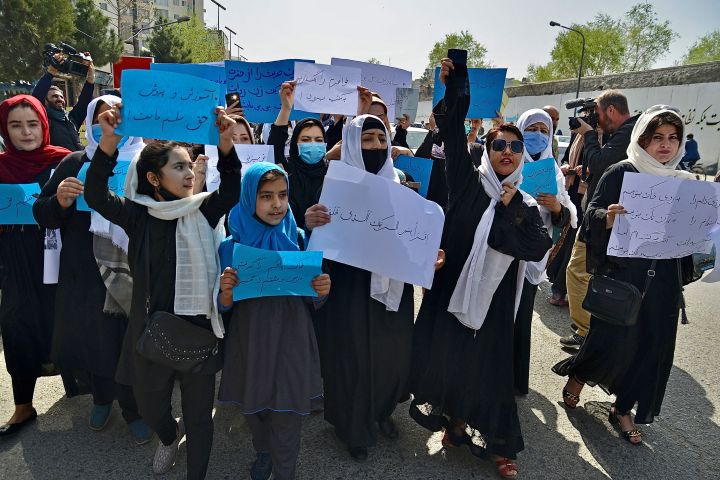
The costs of banning women from education in Afghanistan are felt everywhere
The costs of banning women from education in Afghanistan are felt everywhere

This week, the State Department launched a new initiative meant to break down barriers that keep women around the world from participating in the economy. But in some places, those barriers are only getting higher: a few weeks ago in Afghanistan, the Taliban prohibited women from attending universities there. That’s after an earlier ban prevented them from going to secondary, or high school. The costs of not educating women are felt by individuals, of course, and their communities, but will also have far-reaching economic consequences.
One person who felt the consequences immediately was 18-year-old Wurranga Arif. A few weeks ago, she had just finished her last exam of the semester at Nangarhar University in eastern Afghanistan, and she was feeling good.
“I really had a very good exam,” she said. “I was just about to switch on my computer and watch a movie. Suddenly my brother told me ‘your university’s banned [you].’ It was the worst feeling ever.”
Arif had been studying civil engineering, and said being cut off from school felt like being deprived of oxygen.
“When someone tells you that you cannot live anymore, you cannot survive, you cannot breathe … that was like that,” said Arif.
According to the United Nations, in 2018, about 90,000 women in Afghanistan were enrolled in higher education. That’s less than 5% of the total female population, but still a 1,700% increase from 2001.
Now enrollment in both college and high school is likely closer to zero, estimates Quentin Wodon, an economist with UNESCO.
He did a study with the World Bank in 2018 that found the cost of not educating girls through high school is between $15 trillion and $30 trillion in lost lifetime productivity and earnings.
“If you are better educated, you are more likely to be in the labor force, to be working,” said Wodon.
You’re also likely to make more money. Other benefits: educated women are likely to have healthier children, are less likely to get married as children themselves, and are more likely to positively influence other girls.
“When you have women who are role models, as teachers or head of schools, that gives an additional incentive for adolescent girls to stay in school,” said Wodon.
But the Taliban’s laws are meant to ensure that adolescent girls don’t become formally educated women, points out Sara Wahedi, an entrepreneur and dual citizen of both Canada and Afghanistan, now a student at Columbia University. She had been living in Afghanistan until August 2021.
“It was decades of planning, of dreams, that women had been establishing, that were completely stripped,” said Wahedi.
Fifteen-year-old Sofia Orya is one of those whose dreams have changed.
“My dream was to be a pilot,” said Orya, who lives in Kabul with her parents, grandparents, and two younger brothers.
She was forced to leave her school in August 2021, and switched to taking English classes at a nearby university, with the intent to become a teacher. Then, the most recent ban went into effect.
“I want to try new things. But in this situation, I can’t do it,” said Orya.
Orya’s dad was a flight attendant, but is now out of work, and her mom is working as a tailor. Orya says it’s her responsibility to get an education, and eventually earn money. She’s now looking to online classes to try to make that happen, but Afghanistan’s infrastructure makes that challenging.
“[Often] we don’t have electricity, and we have the problems with the internet, so it’s really hard for us to connect,” said Orya.
Wurranga Arif, who had to leave her university, has also been trying to keep up with her lessons by watching YouTube videos at home on things like linear equations. She says Afghanistan needs civil engineers like her to build infrastructure.
“Everything we need!” she said. “Buildings. Dams. The material of roads are not good. So we need engineers for highways.”
A good example of how the effects of educating–or not educating–women has ramifications for the surrounding world.
There’s a lot happening in the world. Through it all, Marketplace is here for you.
You rely on Marketplace to break down the world’s events and tell you how it affects you in a fact-based, approachable way. We rely on your financial support to keep making that possible.
Your donation today powers the independent journalism that you rely on. For just $5/month, you can help sustain Marketplace so we can keep reporting on the things that matter to you.

















